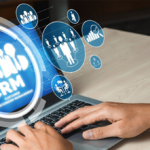Imagine this: You receive an email that seems to know your exact needs and preferences. You visit a website, and the content is tailored precisely to your interests. You scroll through your social media feed, and the pop-up ads reflect products you care about. What's the common thread in this seemingly magical scenario? It's personalization, the cornerstone of modern marketing.
Today, personalization isn't just a nice-to-have; it's a must-have in the business landscape. In fact, according to a study by McKinsey, it is shown that 80% of consumers are more likely to purchase from a brand that offers a personalized experience. The importance of personalization in marketing automation cannot be overstated.
In this blog, we'll embark on a journey to explore the intricate world of personalization with marketing automation tools. We'll uncover why personalization is a critical component of the contemporary business environment and how it's transforming the way we engage with customers.
The Power of Personalization
Personalization is not a new concept, but it is evolving into a dynamic force in modern marketing.
Why is personalization so important?
1. Enhanced Customer Engagement
2. Increased Conversions and Sales
3. Improved Customer Retention
Key Strategies for Crafting Unique Customer Journeys
Now that we've explored why personalization is vital, let's dive into how to make it work for your business.
1. Data-Driven Insights
Personalization is a marketing strategy that involves tailoring content and messaging to individual customers. To achieve effective personalization, businesses need access to data-driven insights that go beyond basic demographic information. These insights can come from analyzing customer behavior, such as how they interact with your brand online. By understanding these behaviors, businesses can gain valuable insights into what motivates customers and how they might respond to different types of messaging.
2. Automation Tools
Marketing automation tools and AI have revolutionized personalization by allowing businesses to analyze large data sets and respond in real-time with personalized content. For example, marketing automation tools can automatically send targeted emails based on customer behavior, such as abandoned shopping carts or previous purchases. Meanwhile, AI-powered recommendation engines can analyze customer data to suggest products or services that are likely to be of interest to them.
3. Audience Segmentation
Segmentation and targeting are also crucial for effective personalization. By segmenting your audience into groups based on their behaviours and preferences, you can tailor your messaging to each segment, making it more relevant. For example, you might segment your audience based on their previous purchases or the pages they've visited on your website. This allows you to create personalized messaging that speaks directly to the interests and needs of each segment, resulting in a more engaging customer experience.
How To Handle Data Collection and Analysis?
Inventory Control
Data is to personalize what fuel is to an engine—it powers the entire process. Without data, personalization simply wouldn't be possible.
Why data is so crucial?
Enhanced Relevance: Data provides insights into who your customers are, what they like, and what they need.
Improved Customer Engagement: Customers who feel you understand them are more likely to engage with your brand.
Increased Conversions and Sales: Data-driven personalization can lead to higher conversion rates and increased sales.
Types of Data to Collect
Effective personalization starts with collecting the right data. To create a holistic view of your customers, consider collecting various types of data, including:
1. Demographics: Basic demographic data such as age, gender, location, and income level provide a foundational understanding of your customers.
2. Behavioural Data: This data, which includes browsing history, purchase history, and engagement with your website or app, offers insights into how customers interact with your brand.
3. Preference Data: Collect information about customer preferences, such as product or content interests, preferred communication channels, and communication frequency.
4. Geographic Data: Understanding where your customers are located can help you provide location-specific offers or content.
5. Transactional Data: Information about past purchases, order history, and transaction amounts can guide product recommendations and upsell strategies.
6. Feedback and Surveys: Direct feedback from customers through surveys, reviews, or customer service interactions can provide valuable qualitative data.
The Role of Data Analysis in Understanding Customer Preferences
Data collection is just the first step; data analysis is where the magic happens. Data analysis involves processing, interpreting, and deriving actionable insights from the collected data.
In the context of personalization, data analysis plays a pivotal role in understanding customer preferences:
• Segmentation: Data analysis helps in segmenting customers into groups based on shared characteristics, behaviours, or preferences. This segmentation allows for more targeted and relevant messaging.
• Pattern Recognition: Analysis of historical data reveals patterns and trends in customer behaviour. Recognizing these patterns enables predictions and proactive personalization.
• Real-Time Personalization: With advanced analysis and automation tools, you can deliver real-time personalization, such as showing relevant products or content during a customer's website visit.
• Continuous Improvement: Regular data analysis allows you to refine your personalization strategies. By identifying what works and what doesn't, you can fine-tune your approach to maximize its effectiveness.
Conclusion
Personalization has become an integral aspect of contemporary business, rather than a mere optional feature. The advantages of personalization are well-documented, with empirical evidence and real-world examples highlighting its transformative impact. Whether you are customizing emails, tailoring content, or creating tailored ads, the journey of personalization is just beginning. Embracing personalization enables marketers to soar to new heights, as they build deeper connections with their audience and offer them the experiences they crave.
In the current business landscape, personalization is no longer a luxury but a necessity. The benefits of personalization are evident, with empirical data and real-world experiences illustrating its transformative power. As the digital landscape continues to evolve, personalization is your compass to navigate these uncharted waters successfully. Embrace it and unlock the full potential of your marketing strategies. Absoft.io brings you a customized and tailored approach when it comes to automating your marketing potential. Your business needs, a tailored approach and you have it, here!
Share your thoughts and explore our solution page to know more. Let us help you address all the marketing concerns and provide you with the best implementations of marketing strategies.











